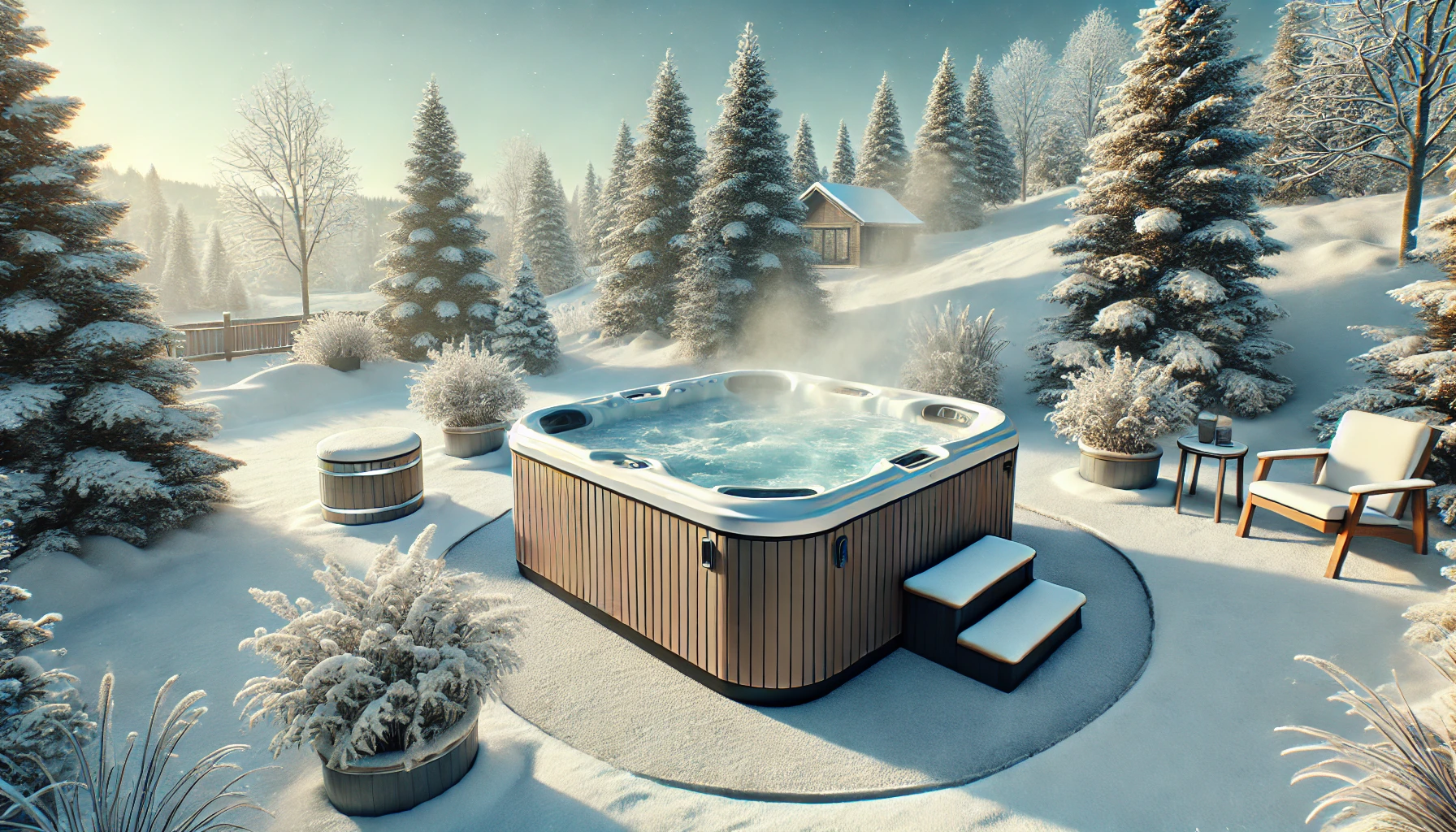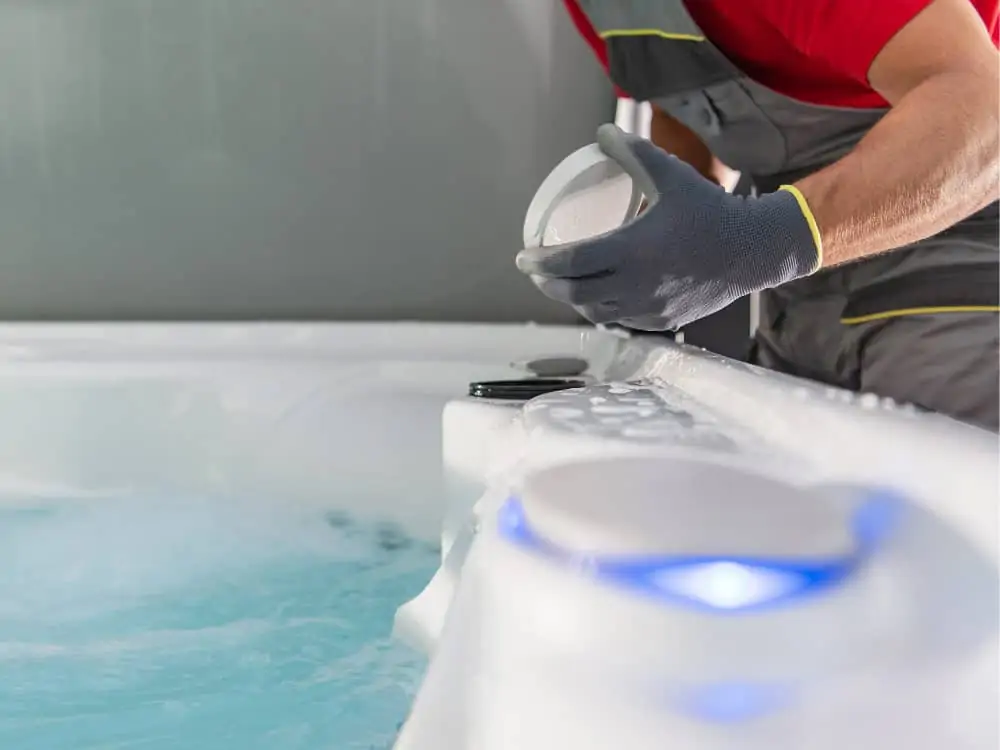It's important to keep your hot tub cover clean to maintain and protect the whole…

How to Keep Mice Out of Hot Tub This Winter: Expert Advice for Spa Owners
Learn essential tips to prevent rodent infestations in your hot tub. Discover how regular maintenance helps keep mice and rats away for a clean, safe spa.
What could be worse than sitting in your spa and being interrupted by a mouse or rat walking on the edge towards you? Even spotting a few signs of mouse activity would be enough to make most people shudder. Nobody wants their luxurious hot tub spot turned into a rodent nest and pest paradise.
So let’s show you a few things you might want to know:
- Why field mice and rodents move into your hot tub
- Why mice could be a bigger problem than you think
- How to prevent and fix the problem
Ready to get into it? Let’s start with the obvious: why this is such a problem.

Why Rodents in Hot Tubs Are a Problem
Rodent infestations in hot tubs aren’t just a nuisance—they bring tangible health risks, can cause costly repairs, and often disrupt the peaceful environment homeowners seek. Let’s examine why these uninvited guests are such a serious issue.
Health Risks
When rodents enter a hot tub area, they don’t just bring themselves; they bring diseases that can seriously affect human health. Mice and rats can carry pathogens that lead to conditions like hantavirus, leptospirosis, and salmonella. These diseases can be transmitted through rodent droppings, urine, or saliva, contaminating the hot tub area. Even indirect contact with these contaminants—through spa water or surfaces—can be enough to pose a risk.
Infected rodents can leave bacteria-laden droppings that, if they come into contact with the water, can alter its chemistry and introduce pathogens. This contamination can lead to gastrointestinal illnesses and skin infections for anyone using the spa. Regular sanitization and vigilant inspection are essential to ensure healthy water chemistry and a safe hot tub environment, especially if there’s any sign of rodent activity.
Damage to Equipment and Insulation
Beyond health risks, rodents are infamous for causing physical damage. Mice and rats tend to chew on just about anything, and hot tubs provide ample opportunities for gnawing. From chewing on wiring to damaging insulation, rodents can cause significant structural and functional damage to a hot tub, leading to costly repairs.
Chewed wires can result in short circuits, malfunctions, or even fire hazards if the damage goes unnoticed. Additionally, rodents burrowing into insulation can disrupt the tub’s heat retention, leading to inefficiencies that raise energy costs. Repairing rodent-related damage can range from minor patch-ups to complete replacements of certain hot tub components, potentially costing hundreds or even thousands of dollars.
Psychological Impact on Owners
Finding evidence of a single mouse, let alone a full rodent infestation, can be unsettling, especially in a space meant for relaxation and personal care. Knowing that mice or rats are nesting in or around your hot tub can add stress and unease, taking away from the enjoyment of the spa experience.
The very idea of rodents in a relaxation space can make homeowners feel as if they’re fighting a losing battle against pests. This stress can be compounded if signs of rodents keep reappearing despite cleaning and prevention efforts. For many, addressing a rodent infestation isn’t just about physical cleanup but restoring peace of mind.
Quick Tips for Hot Tub Owners
Just want a solution? Let’s give you a few quick tips before taking a deeper dive into all you want to know about the issues of mice and spas.
Best Practices for Preventing Infestations
Following some basic practices can help maintain a rodent-free hot tub:
- Routine Inspections: Regularly check for signs of rodents and maintain a consistent cleaning schedule.
- Maintain Surroundings: Trim bushes and clean up debris to eliminate hiding spots around the hot tub.
- Secure Food and Trash: Keep the area around your hot tub free of food sources and securely close trash containers.
Seasonal Advice for Hot Tub Pest Control
During colder months, rodents are more likely to seek warm shelter. Increase inspection frequency in fall and winter, and apply extra preventative measures like sealing entry points and using repellents.
How Rodent Infestations Happen
Understanding how and why rodents are attracted to hot tubs can help homeowners take proactive steps to prevent infestations. From natural attractions to structural vulnerabilities, here’s a closer look at how these pests find their way into hot tubs.
What Attracts Rodents to Hot Tubs?
Hot tubs and spas offer an appealing environment for rodents, particularly in colder months. The warm, insulated spaces are ideal for nesting and staying protected from outdoor elements. For rodents, hot tubs can serve as cozy shelters that offer both warmth and security, especially when temperatures drop.
The smell of food, trash, or compost nearby can also attract rodents to the hot tub area. Leftover snacks from hot tub parties, or even food particles caught in the surrounding area, can make the space more enticing. Additionally, hot tubs located near wooded areas or gardens are more likely to experience rodent issues, as these locations provide natural food sources and cover.
Common Entry Points for Mice and Rats
Rodents can squeeze through surprisingly small openings, making it essential to identify potential entry points in and around a hot tub. Gaps in panels, holes around pipes, and loose insulation around wiring can all serve as entry routes for determined rodents. Because of their ability to squeeze through openings as small as a dime, even minor gaps can present a risk.
Other vulnerable areas include vent openings, access panels, and any cracks in the tub’s exterior shell. Routine inspection of these areas can help homeowners catch entry points early before they become highways for pests.
Common Entry Points:
- Gaps around pipes and electrical wiring
- Loose or damaged insulation
- Cracks or gaps in hot tub panels or casing
- Unsealed areas around access panels or vents
Rodent Behavior and Nesting Habits
Mice and rats are prolific breeders, and a small problem can quickly turn into a major infestation. Once they find a suitable environment, such as the warm space around a hot tub, they’ll likely start nesting and reproducing. Rodents are nocturnal by nature, meaning they may go unnoticed as they move about at night, foraging for food and expanding their nests.
The rapid breeding cycle of mice and rats can mean that a few pests quickly become a much larger problem. If left unchecked, a hot tub area can become a permanent nesting site, increasing the likelihood of structural damage and health risks.
How to Prevent and Handle Rodent Infestations
While rodent infestations can be a challenge, there are proactive steps hot tub owners can take to keep their spa area pest-free. From basic prevention to handling active infestations, these strategies can help protect your investment and maintain a clean, rodent-free hot tub space.
Prevention Strategies
The best approach to rodent control is prevention. By making the hot tub area less attractive to pests, homeowners can reduce the risk of infestation. Regular cleaning, removing food sources, and keeping the area clear of debris are simple yet effective steps.
Key Prevention Tips:
- Clean Up Food and Trash: Dispose of any food remnants or trash near the hot tub, and ensure that garbage cans are sealed tightly.
- Eliminate Hiding Spots: Keep the surrounding area free of clutter, such as piles of leaves, wood, or garden tools, which can offer shelter to rodents.
- Seal Entry Points: Use caulking, steel wool, or wire mesh to block gaps around pipes, electrical lines, and other vulnerable spots.
- Natural Repellents: Consider using natural rodent repellents, like peppermint oil or plants with strong scents, to discourage rodents from approaching.
Regular maintenance and small adjustments to the environment can go a long way in making your hot tub less inviting to rodents.
Inspection and Maintenance Tips
Regular inspections are essential for catching signs of rodent activity before they escalate. A monthly check during fall and winter months, as well as after storms, can reveal early indicators of a problem.
When inspecting, look for droppings, gnaw marks, and any signs of nesting materials like shredded paper or fabric. Check around access panels, under insulation, and around wiring for any signs of damage or debris. If you spot even minor signs, take steps immediately to prevent further damage.
Signs of Rodent Activity:
- Small black or brown droppings around the hot tub
- Chewed or frayed wiring and insulation
- Nesting materials such as shredded fabric, paper, or insulation
- Footprints or unusual smells around the equipment area
Solutions for Active Infestations
If you discover an active infestation, there are safe and humane ways to handle it. Humane traps, such as catch-and-release options, can effectively remove rodents without causing harm. Ultrasonic repellents and peppermint oil sprays can also deter rodents from returning.
In cases where the infestation persists despite DIY methods, it may be time to call in professional pest control. Professionals can provide more comprehensive solutions and help prevent future issues.
Recommended Control Options:
- Humane Mouse Traps: Safe for catching and releasing rodents.
- Peppermint Oil Spray: Apply around entry points to deter rodents.
- Ultrasonic Repellents: These devices emit sound frequencies that discourage rodents from nesting nearby.
Professional pest control services should be considered if DIY methods fail or if damage becomes extensive. Professionals can assess the scope of the problem, repair damage, and implement preventative measures.
If you’ve spotted a rat in your hot tub or need to know how to get rid of mice under your hot tub, act quickly to prevent further nesting. Start by placing humane traps or bait stations around the base of the hot tub, focusing on areas with droppings or chew marks. Wear gloves when handling traps or cleaning up droppings to avoid contact with potential pathogens. After removing the rodents, thoroughly disinfect the area and seal any entry points to prevent re-entry. For persistent issues, professional pest control can offer targeted solutions to clear out rodents nesting beneath your spa.
How to Rodent-Proof Your Hot Tub
Creating a rodent-proof hot tub involves making your spa an unappealing and inaccessible target for mice and rats. By focusing on the areas most vulnerable to rodent entry, such as under the hot tub, you can significantly reduce the risk of infestations. Here’s how to keep mice out from under your hot tub and ensure a fully rodent-proof setup.
Steps to Secure Your Hot Tub
Rodents often target the warm, sheltered space beneath a hot tub, where insulation and wiring are easily accessible. To rodent-proof your hot tub, start by addressing these key areas:
- Install a Skirt Barrier: Use durable materials like metal mesh or PVC panels to enclose the base of your hot tub, preventing access to the underside.
- Seal Gaps with Foam or Mesh: Apply expanding foam or steel wool to seal gaps around pipes and wiring, ensuring no entry points remain.
- Elevate the Hot Tub: If possible, place your hot tub on a raised concrete pad to reduce ground-level access for rodents.
- Use Rodent-Repellent Materials: Surround the hot tub base with gravel or stones, which are less appealing to rodents than dirt or grass.
By implementing these measures, you can create a rodent-proof hot tub that’s tough for mice and rats to infiltrate, especially in the vulnerable space under the spa.
Comparing Rodent-Proofing Materials
Choosing the right materials is key to long-lasting protection. The table below compares common rodent-proofing materials to help you decide what’s best for your hot tub.
| Material | Durability | Cost | Effectiveness |
|---|---|---|---|
| Steel Wool | Moderate | Low | High for small gaps |
| Metal Mesh | High | Moderate | Excellent for barriers |
| Expanding Foam | Moderate | Low | Good for sealing |
| PVC Panels | High | High | Very effective for skirting |
Hot Tub Maintenance: Keep Your Spa Clean and Rodent-Free
Regular hot tub maintenance isn’t just about water quality and equipment longevity—it’s also a smart way to spot early signs of rodent activity. By adding a quick visual check for signs of mice and rats to your routine, you can catch small issues before they turn into bigger problems. Look for droppings, chew marks, or nesting materials around access panels, wiring, and insulation during your usual maintenance tasks. These simple checks can go a long way in keeping your hot tub pest-free.
Many hot tub owners wonder, “Do hot tubs attract rats?” The answer lies in how well you maintain your spa. Spilled water, food debris, or neglected insulation can create an inviting environment for rodents, leading to rats under your hot tub. By keeping the spa area clean, promptly repairing leaks, and ensuring the cover fits securely, you can minimize attractions that draw rodents. Regular maintenance not only keeps your hot tub in top shape but also makes it far less appealing to pests seeking shelter or food.
What other maintenance should you be doing? Keeping your spa in top condition requires a range of tasks to ensure safe, clean, and efficient use. Here are some essential articles to guide you on a complete maintenance routine:
- Cost of Hot Tub Maintenance: A comprehensive guide on maintenance costs and how regular upkeep saves money in the long run.
- How to Clean a Hot Tub Filter: Learn the best methods to clean filters, essential for keeping your water quality high.
- Best Hot Tub for Winter: Tips on choosing a hot tub that’s well-suited for colder months, when rodent risks are higher.
- Why is My Hot Tub Cloudy?: Troubleshoot cloudy water issues to maintain clear, inviting water.
- Hot Tub Water Testing: Regular water testing keeps your hot tub hygienic and balanced, creating a more enjoyable experience.

These maintenance tasks are key to a clean, well-functioning hot tub that’s enjoyable for you and unappealing to rodents.
Conclusion
Rodents may be a persistent nuisance, but with the right preventive and responsive strategies, you can keep your hot tub area free from infestations. Regular inspections, sealing entry points, and using repellents will protect both your investment and peace of mind. By staying proactive, you’ll ensure a safe, clean, and enjoyable hot tub experience.
If you want more advice or help, our team of friendly experts can point you in the right direction. We’re not exterminators or pest control experts. But we do know a lot about hot tubs, accessories, and how to have a safe and enjoyable spa. That’s why we’re called Epic Hot Tubs!
FAQ
How do mice and rats get into hot tubs?
Rodents find entry through small gaps around pipes, wiring, and access panels. Sealing these areas can prevent entry.
What diseases can rodents around hot tubs carry?
Rodents carry diseases like hantavirus, leptospirosis, and salmonella, which can spread through droppings and contaminated water.
Are there natural ways to repel rodents from hot tubs?
Yes, peppermint oil and ultrasonic repellents are effective, non-toxic deterrents for keeping rodents away.
How much does it cost to repair rodent damage in hot tubs?
Repair costs vary but can range from $100 for minor damage to thousands for extensive repairs.
When should I call a professional pest control service for my hot tub?
If DIY measures fail or damage becomes severe, consulting a professional can provide comprehensive solutions and prevent recurrence.
Do hot tubs attract rats?
Hot tubs can attract rats if food, debris, or warm, sheltered spaces are available. To prevent this, keep the area clean, secure food sources, and seal entry points. Regular maintenance and inspections ensure your hot tub remains an unappealing target for rodents.

Ready to purchase a hot tub in NC?
Call us at 888-884-3742 or fill out the form below to get in touch with a member or our team.
Richard Horvath
Richard has been in the hot tub & spa industry for years. As a long hot tub & swim spa owner himself, Richard has a passion for helping homeowners create their dream backyard.



